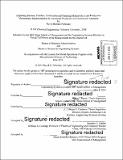| dc.contributor.advisor | Steven J. Spear and Bruce G. Cameron. | en_US |
| dc.contributor.author | Feliciano, David Michael | en_US |
| dc.contributor.other | Leaders for Global Operations Program. | en_US |
| dc.date.accessioned | 2015-09-29T18:57:31Z | |
| dc.date.available | 2015-09-29T18:57:31Z | |
| dc.date.copyright | 2015 | en_US |
| dc.date.issued | 2015 | en_US |
| dc.identifier.uri | http://hdl.handle.net/1721.1/98998 | |
| dc.description | Thesis: M.B.A., Massachusetts Institute of Technology, Sloan School of Management, 2015. In conjunction with the Leaders for Global Operations Program at MIT. | en_US |
| dc.description | Thesis: S.M., Massachusetts Institute of Technology, Engineering Systems Division, 2015. In conjunction with the Leaders for Global Operations Program at MIT. | en_US |
| dc.description | Cataloged from PDF version of thesis. | en_US |
| dc.description | Includes bibliographical references (pages 87-90). | en_US |
| dc.description.abstract | The 737 program is currently producing 42 airplanes per month and will increase that production rate to 47 per month by 2017 and 52 per month in 2018 [1] [2]. In order to help meet these rates Boeing plans to increase the amount of automation in the shop that produces front and rear spars for all 737 variants. To mitigate risks associated with increased automation, the automation design team would like to implement an approach to equipment maintenance and operation known as Total Productive Maintenance (TPM). However the justification for TPM was not clear and an implementation strategy did not exist. The focus of this thesis therefore, is to clarify the justification for TPM, understand how TPM could impact the production system, identify the barriers and enablers of TPM implementation at Boeing, and present a TPM implementation plan that will be appropriate and effective for the particular context in which it will be executed. An analysis of current maintenance data and practices, case studies within the current factory, and a qualitative analysis of the future production system suggest that TPM could provide many quantitative and qualitative benefits and that the new production system is a good candidate for TPM. Results from a discrete event model show that TPM poses minimal risk of disrupting the future production system. Results of an employee survey show that the most important factors to successful TPM implementation are related to planning and building support prior to implementation. These findings influenced the design of the TPM implementation plan presented in this thesis, which focuses initially on building support, planning, and training. As the airline industry adopts automated equipment in response to increased competition, TPM may become an important strategy for staying competitive. The multi-pronged analyses demonstrated in this thesis for justifying TPM, the survey method used to understand the company-specific barriers and enablers of TPM, and the method of designing a customized TPM implementation plan based on the insights from these analyses can serve as a general model for implementing TPM within Boeing and within the broader airline industry. | en_US |
| dc.description.statementofresponsibility | by David Michael Feliciano. | en_US |
| dc.format.extent | 95 pages | en_US |
| dc.language.iso | eng | en_US |
| dc.publisher | Massachusetts Institute of Technology | en_US |
| dc.rights | M.I.T. theses are protected by copyright. They may be viewed from this source for any purpose, but reproduction or distribution in any format is prohibited without written permission. See provided URL for inquiries about permission. | en_US |
| dc.rights.uri | http://dspace.mit.edu/handle/1721.1/7582 | en_US |
| dc.subject | Sloan School of Management. | en_US |
| dc.subject | Engineering Systems Division. | en_US |
| dc.subject | Leaders for Global Operations Program. | en_US |
| dc.title | Exploring barriers, enablers,jJustification and planning methods for total productive maintenance implementation in automated production of commercial airplanes | en_US |
| dc.type | Thesis | en_US |
| dc.description.degree | M.B.A. | en_US |
| dc.description.degree | S.M. | en_US |
| dc.contributor.department | Leaders for Global Operations Program at MIT | en_US |
| dc.contributor.department | Massachusetts Institute of Technology. Engineering Systems Division | |
| dc.contributor.department | Sloan School of Management | |
| dc.identifier.oclc | 921181815 | en_US |
